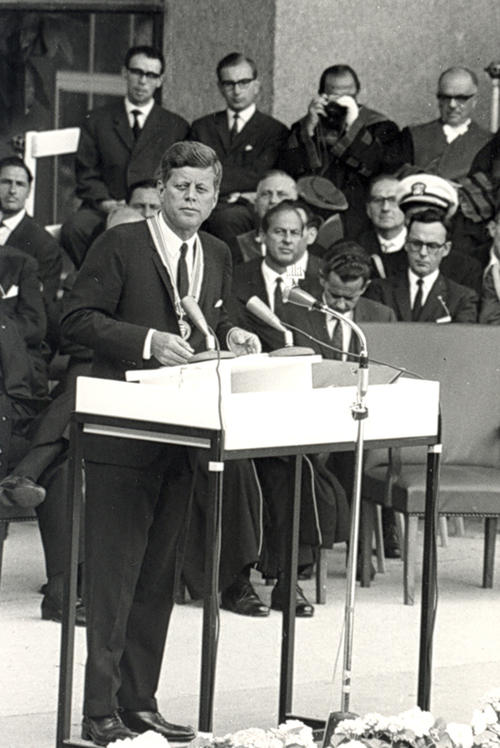Ich bin ein Dahlemer
His speech at Schöneberg’s city hall is etched in memory, but the content of Kennedy’s speech at Freie Universität was actually more important.
Kennedy’s message in Dahlem is more programmatic than the one in at the Schöneberg City Hall. He basically said, “We will protect you, but it won’t be possible without negotiations with Moscow.”
Image Credit: Reinhard Friedrich/Universitätsarchiv Freie Universität Berlin
One sentence echoes down through the years: “Ich bin ein Berliner.” It is more than an announcement of solidarity. This statement of maximum identification means protection from the Soviet Union; it is a promise of freedom. Some Berliners even take it as a political declaration of love. Relieved, hundreds of thousands cheer – and Kennedy enjoys it, standing there as if entranced for several minutes after the speech is over. The Freedom Bell in the city hall tower has long stopped tolling, Brandt has already invited the U.S. delegation inside. But it was not Kennedy’s speech at Rathaus Schöneberg, but rather a later one, delivered across town in Dahlem, that would turn out to have the more important content.
That is how Egon Bahr sees it, for one. At the time, he was the speaker of the Senate under Governing Mayor Willy Brandt. “We didn’t know in advance what he was going to say,” Bahr says. “In his speech, he praised cooperation with Moscow in the interests of European stability.” Bahr sees this as encouragement for the policy the coalition of social and liberal parties would later implement toward the East. The Frankfurter Allgemeine Zeitung, a major German news daily, offers a similar analysis: Kennedy’s speech at Freie Universität was, “viewed in the long term, the more important political statement,” since it was in line with the burgeoning policy of détente.
Ich bin ein Dahlemer! Kennedy never said that – not even at the Henry Ford Building – but his message to Berlin and Germany is similar, just much more sophisticated and programmatic than the one he delivered in Schöneberg: We will protect you, with military intervention if necessary. But we have to acknowledge the reality of the situation – it won’t work unless there are negotiations with Moscow.
A challenge and a commitment: Freie Universität urged to turn out citizens of the world
He also has a few words for Freie Universität specifically: “This school – and this must be true of every university – must be interested in turning out citizens of the world, men who comprehend the difficult, sensitive tasks, that lie before us as free men and women, and men who are willing to commit their energies to the advancement of a free society.”
It is a challenge and a commitment at once: Freie Universität is charged with educating people who will strive in the cause of freedom. “Applause broke out constantly,” recalls Thomas Lennert, who was a student at the time. He stood amid the close-packed crowd on the green, with only a distant view of the American statesman.
Heinz Fortak, then 35, was closer. A professor of meteorology, he was permitted to sit with other university instructors in a semicircle on the stage, just a few meters away from the U.S. President. “I was deeply moved by the speech,” he recalls.
“We saw him almost as a savior.”
“The renewed emphasis of the freedom of the Western world and the sharp distinction between that and the ideology of the East in his speech were in line with our beliefs,” says Volkmar Schneider, who was studying medicine at the time. He perceives the speech as encouragement: “After the Wall was built, the President brought hope to us in West Berlin, hope for a life lived in freedom.”
Others also have clear impressions of the speech. Tom Sommerlatte, at the time a student of chemistry at Freie Universität, later recalls “a tremendous surge of solidarity between the emotional audience and this man who radiated self-confidence and commitment.” Law student Dietrich Weitz was working on his doctorate at the time. He later commented on the “great euphoria” that overcame him and his fellow students during Kennedy’s visit: “We saw him almost as a savior.”

